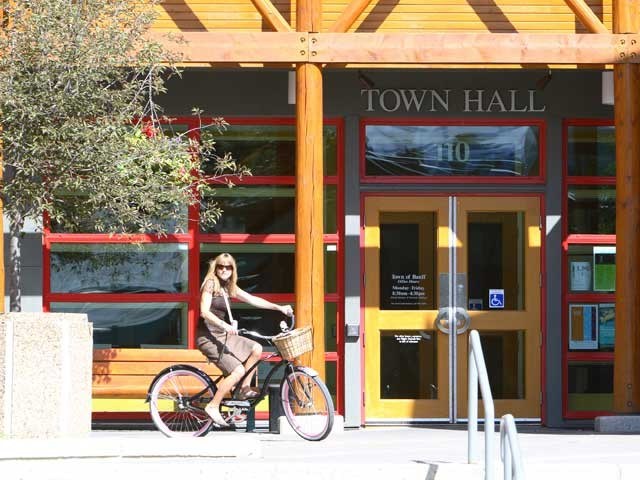Keeping taxes down during times of economic recession is tough. And staff at the Resort Municipality of Whistler were not alone this year in their struggle to balance the budget, maintain service levels, and hold taxes steady.
Financial advisors at the Town of Banff projected a tax increase but were forced to rework the numbers after their council decided to freeze taxes in light of the economic downturn.
"Our three year budget currently shows increases in 2010 and 2011, but no increases this year," reported Kelly Gibson, senior accountant for Banff. Banff's tax increases over the next three years will total 12 per cent.
"Council, when they were deliberating, started along the same path they normally do, but in anticipation of this year they decided to freeze the tax increase."
The tax increase was whittled down, said Gibson, mainly be freezing employee wages, and no lay offs were made.
"It was a complete freeze. The cost of living increase, and everything, was frozen."
Meanwhile, down south in Colorado, staff at the Town of Breckenridge wrestled with how to cut their budget after enjoying several years of higher-than-normal sales tax revenue and real estate transfer tax.
By eliminating all raises, freezing vacant jobs and trimming services, accountants at Breckenridge have sliced $2.1 million off their $24 million budget, about 10 per cent.
"Our general philosophy is to look at the expenditure side and try and manage that first, and then council has to make a choice when we start looking at actually services." said Tim Gagen, town manager of Breckenridge.
Gagen said the cuts have not been controversial.
"At least, not at this stage, but we have not really hit anything in terms of the service yet," he said.
"The next stage will be that, if we continue to see no recovery in those major revenue streams."
Accountants took the scalpel to the Town of Vail's budget this year too, cutting $1.3 million out of expenditures.
Like Breckenridge, Vail had seen high sales tax revenue in recent years. And, after a spurt of redevelopment in 2004, Vail increased staff by 12 positions. Now, though, seven and a half of those positions have been eliminated and two vacant ones have been frozen.
"Thankfully a lot of those weren't filled," said Kathleen Halloran, manager of budgets and financial reporting for the Town of Vail.
In keeping with the trend in Colorado, the City of Aspen also cut their budget by $3.4 million this year, following recent years of high sales tax revenue. In response to the increased revenue, at least 13 new positions were added to staff. Seven of those jobs have now been cut.
Also, staff at Aspen froze several vacant positions and cut their bonus payment program.
Closer to home, Vancouver Council has approved an increase in property taxes to cover a $31.1 million gap in their budget.
But, while in previous years the tax increase would have likely been six per cent, Vancouver's council voted to redistribute taxes between businesses and residents. In other words, residents are faced with a 8.3 per cent tax increase while business owners will see a 4.3 per cent tax increase.
Further north along Sea to Sky highway, District of Squamish Council is still wrestling with their budget numbers.
Earlier this year, Squamish municipal staff calculated that a 17 per cent tax increase would be necessary for the town to maintain service levels. But Squamish's financial advisory committee then asked staff to go back, rework the numbers, and look at actually decreasing property taxes 4 per cent below 2008 levels.
Squamish's 2009 tax increase will likely rest somewhere between these two figures. (See related story).
Not everyone is slashing expenditures or hiking up taxes, though.
According to Nikki Gilmore, manager of finance for the Village of Pemberton, residents can expect a three per cent tax increase this year - a number which is on par with previous years and close to the consumer price index (CPI) in Vancouver.
The village also hasn't made any cuts to its budgets or laid off staff.
"We have a very tight budget as it is," said Gilmore.
"We don't have very many additional expenses that we can afford, so we try to be able to pick off some projects based on our strategic plan and go forward with that. We phase them over the years, so we can afford to do it, and taxpayers can too."
Every city, town and village of course has a unique financial landscape and comparing budgets can be tricky. For example municipalities in the United States receive the largest proportion of their revenue from sales tax, whereas the largest source of revenue for municipalities in Canada is from property taxes.
Whistler's own situation is distinct because the resort municipality has recently hit its growth cap, meaning revenue from development is winding down, and the amount of hotel tax the municipality receives has declined through changes to tax classifications and declining business.
Whistler taxpayers are now faced with a 19 per cent tax increase over the next three years to bridge a $5.7 million shortfall. Specifically, taxpayers will see an eight per cent jump this year, a seven per cent increase in 2010 and a four per cent increase in 2012.




